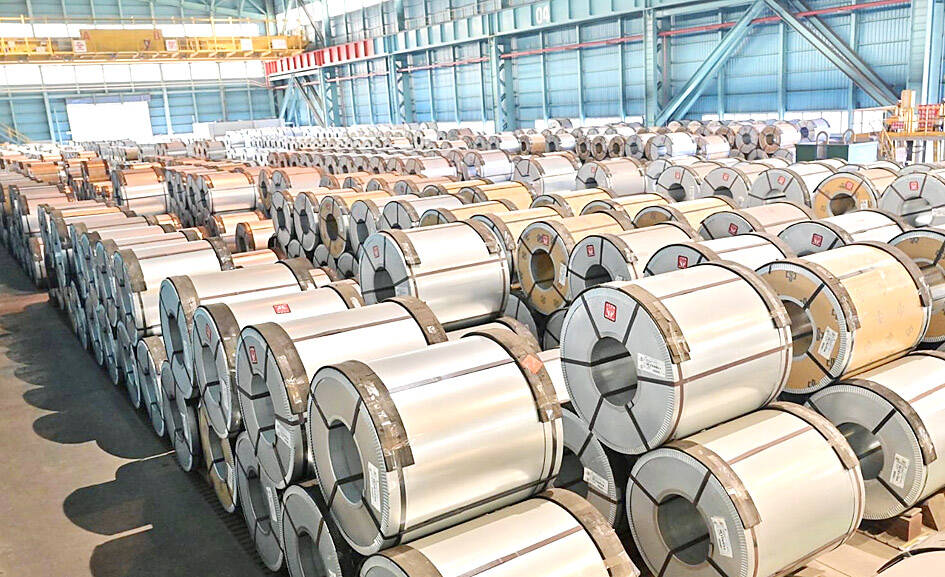A move by US President Donald Trump to slap a 25 percent tariff on all steel imports is expected to place Taiwan-made steel, which already has a 25 percent tariff, on an equal footing, the Taiwan Steel & Iron Industries Association said yesterday.
Speaking with CNA, association chairman Hwang Chien-chih (黃建智) said such an equal footing is expected to boost Taiwan’s competitive edge against other countries in the US market, describing the tariffs as "positive" for Taiwanese steel exporters.
On Monday, Trump signed two executive orders imposing the new metal tariffs on imported steel and aluminum with no exceptions and exemptions, effective next month.

Photo courtesy of China Steel Corp
According to foreign media reports, Taiwan ranked the eighth largest steel exporter to the US market last year, selling 1.01 million tonnes of steel products, behind Canada (6.56 million tonnes), Brazil (4.50 million tonnes) and Mexico (3.52 million tonnes).
Hwang, also chairman of China Steel Corp (中鋼), the largest steel maker in Taiwan, said the new executive orders, which will take away an exemption status from Canada, Mexico, Japan and the European Union, are expected to help Taiwan sell more steel products to the US.
The tariffs are also expected to push up steel prices in the US market, benefiting Taiwanese exporters, he said.
Prices of hot rolled steel products have risen to US$837 per tonne from US$767 since Trump took office on Jan. 20, and the prices could hit US$1,000 per tonne shortly due to the tariffs, he added.
Meanwhile, an executive from Yieh Phui Enterprise Co (燁輝), another major steel supplier in Taiwan, said the 25 percent tariffs mainly targeted the leading exporters such as Canada and Mexico, which enjoyed a large trade surplus with the US.
Once the new tariffs become effective, the executive said steel imports to the US market are expected to move lower, which could push up product prices there and allow Yieh Phui to improve its profitability. Currently, the US market accounts for half of the company’s total exports, he said
Chung Hung Steel Corp (中鴻), another Taiwanese steel maker, said the new tariffs will change the current unfair competition in the US market as many countries enjoy an exemption, a positive trend to Taiwan.
However, Hwang said Trump’s tariffs on steel could cut both ways for Taiwanese exporters.
He said these countries which will be taking away tariff exemption are likely to ship their products to other markets such as Asia or Europe at lower prices to make up the losses in sales in the US, which could place Taiwan under new competition.
He added as the new tariffs will not go into effect until March, Trump could change his mind before that, urging Taiwanese exporters to keep a close eye on the situation.

STEEP DECLINE: Yesterday’s drop was the third-steepest in its history, the steepest being Monday’s drop in the wake of the tariff announcement on Wednesday last week Taiwanese stocks continued their heavy sell-off yesterday, as concerns over US tariffs and unwinding of leveraged bets weighed on the market. The benchmark TAIEX plunged 1,068.19 points, or 5.79 percent, to 17,391.76, notching the biggest drop among Asian peers as it hit a 15-month low. The decline came even after the government on late Tuesday authorized the NT$500 billion (US$15.2 billion) National Stabilization Fund (國安基金) to step in to buoy the market amid investors’ worries over tariffs imposed by US President Donald Trump. Yesterday’s decline was the third-steepest in its history, trailing only the declines of 2,065.87 points on Monday and

TAKING STOCK: A Taiwanese cookware firm in Vietnam urged customers to assess inventory or place orders early so shipments can reach the US while tariffs are paused Taiwanese businesses in Vietnam are exploring alternatives after the White House imposed a 46 percent import duty on Vietnamese goods, following US President Donald Trump’s announcement of “reciprocal” tariffs on the US’ trading partners. Lo Shih-liang (羅世良), chairman of Brico Industry Co (裕茂工業), a Taiwanese company that manufactures cast iron cookware and stove components in Vietnam, said that more than 40 percent of his business was tied to the US market, describing the constant US policy shifts as an emotional roller coaster. “I work during the day and stay up all night watching the news. I’ve been following US news until 3am

Six years ago, LVMH’s billionaire CEO Bernard Arnault and US President Donald Trump cut the blue ribbon on a factory in rural Texas that would make designer handbags for Louis Vuitton, one of the world’s best-known luxury brands. However, since the high-profile opening, the factory has faced a host of problems limiting production, 11 former Louis Vuitton employees said. The site has consistently ranked among the worst-performing for Louis Vuitton globally, “significantly” underperforming other facilities, said three former Louis Vuitton workers and a senior industry source, who cited internal rankings shared with staff. The plant’s problems — which have not

TARIFF CONCERNS: The chipmaker cited global uncertainty from US tariffs and a weakening economic outlook, but said its Singapore expansion remains on track Vanguard International Semiconductor Corp (世界先進), a foundry service provider specializing in producing power management and display driver chips, yesterday withdrew its full-year revenue projection of moderate growth for this year, as escalating US tariff tensions raised uncertainty and concern about a potential economic recession. The Hsinchu-based chipmaker in February said revenues this year would grow mildly from last year based on improving supply chain inventory levels and market demand. At the time, it also anticipated gradual quarter revenue growth. However, the US’ sweeping tariff policy has upended the industry’s supply chains and weakened economic prospects for the world economy, it said. “Now